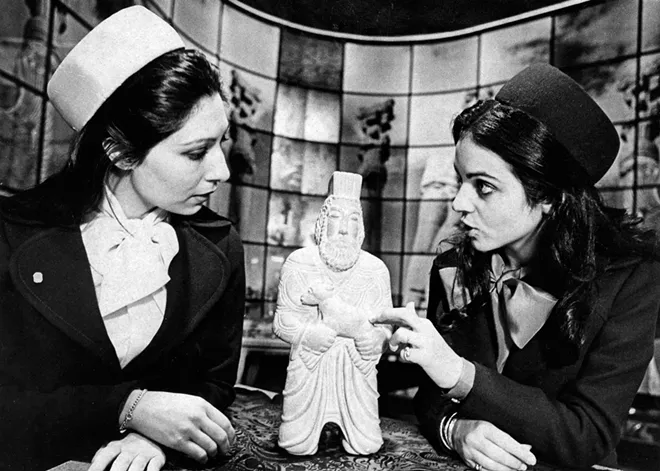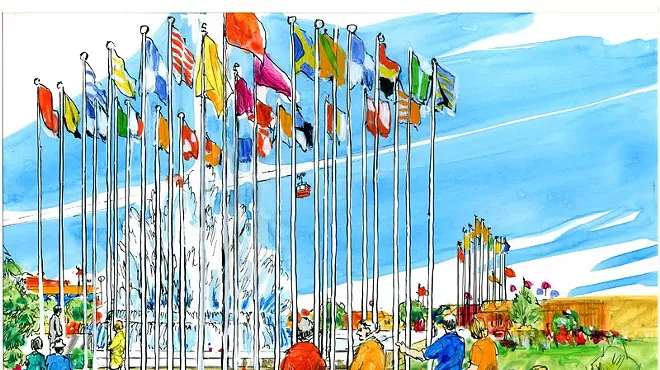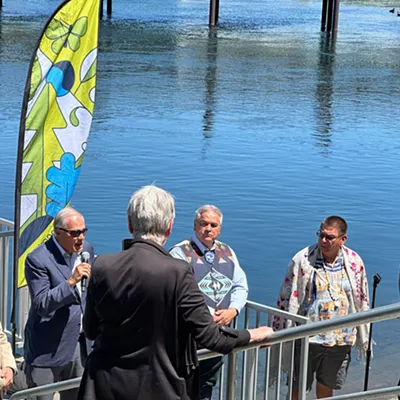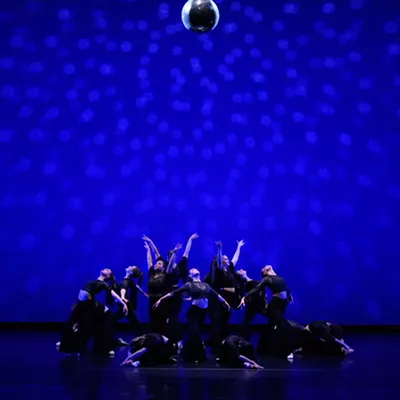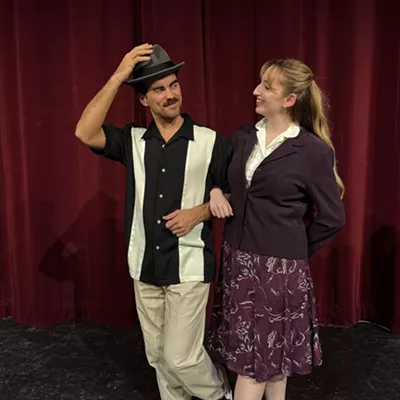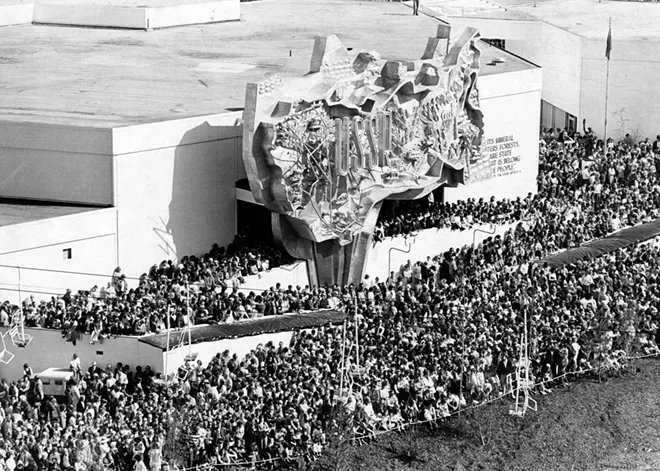
Today, Spokane is a hub of Russian and Slavic culture. The city has more than a dozen Russian-language churches and several Slavic grocery stores. Russian is the third most-commonly spoken language, behind English and Spanish.
"It's very common," says Vinson Eberly, who recently retired after spending years as a Russian translator in Spokane. "You go someplace, you hear someone speaking Russian, and you don't even bother turning your head anymore."
That wasn't always the case.
In the early 1970s, Russian-speaking people were few and far between in Spokane. At the time, Eberly was 20 years old and studying Russian language at Eastern Washington University. Decades of Cold War tensions had created an air of mistrust between the United States and the Soviet Union. Like most Americans, he had never actually spoken to a native Russian speaker before.
That all changed in 1974, when the Soviet Union sent a delegation of about 200 people to Spokane to host a massive pavilion in the Expo '74 World's Fair. That summer, there were more Soviets working in Spokane than in any other American city.
The USSR was one of the first countries to commit to staging an exhibition at the fair. The country hadn't participated in an American world's fair since 1939, but Soviet officials were excited about the Spokane fair's environmental theme. President Richard Nixon had signed an environmental accord with the Soviet Union a few years earlier as part of a larger move toward Cold War "détente" — or easing of tensions — in the 1970s.
The Soviet Union's early commitment gave momentum to the organizers of the fair. In The Fair and the Falls, a mammoth history of Expo '74, historian Bill Youngs writes that the Soviets' presence in Spokane "was one of the most remarkable features of the environmental world's fair.
"More than any other exhibitor, foreign or domestic, the Soviet Union had put Expo '74 on the map," Youngs writes. "The USSR signed up for the fair early, did not vacillate about attending, and built one of the largest pavilions ever to grace an American world's fair."
CULTURAL DIFFERENCES
In the runup to the event, the vice president of the USSR Chamber of Commerce wrote a letter to King Cole, the leader of the fair effort, saying the Soviets' early decision to commit to Expo gave "priority to the Soviet Union in choosing the location for the USSR section, which might amount to some 30,000 to 35,000 square feet."
The size of the Soviet pavilion was later doubled — making it by far the largest exhibition at Expo. It featured a 4,500-pound aluminum map of the USSR, artificial trees, dioramas about nuclear physics and forestry, three movie theaters, and a massive towering bust of Vladimir Lenin's head, which terrified at least one small child.
The Soviet delegation also operated a restaurant that was staffed by a number of Russian chefs brought over from Moscow. It served chicken kiev, beef stroganoff and other Slavic dishes.
Eberly, the Russian language college student, was hired to work in the kitchen as a translator. The regular kitchen helpers were making $1.75 an hour, but because he was working as a translator, Eberly says he made a "whopping" $2.25.
Eberly remembers some Spokanites being apprehensive about the Soviets' presence. The arms race and Vietnam War were fresh in people's minds, and many expressed concern about hosting America's geopolitical adversary.
"They were wary, because this was the unknown," Eberly says. "We as Americans had been fed that 'This is our enemy.'"
In The Fair and the Falls, Youngs describes an incident in which a man stuck his head out of a passing pickup truck and yelled, "Why don't you damn Russians go home?!" at several members of the Soviet delegation walking near the Spokane Club. The Jewish League protested Soviet restrictions on Jewish emigration from the USSR by passing out Expo maps that urged people to reflect on the value of free movement as they walked through the fairgrounds.
The suspicions and cultural differences cut both ways. Some visitors described the Soviets as cold and standoffish.
When executives from Ford Motor Company visited the Soviet Pavilion, they received a lecture from the Soviets about how the American car manufacturer was oppressing its workers. When U.S. bomber planes' standard flight path from Fairchild Air Force Base took them over the Soviet pavilion, the delegation's security chief grew suspicious and complained about it to a police captain assigned to the fair.
But over the course of the fair, the Americans and Soviets were largely able to put aside the political tensions and cultural differences and find common ground. Eberly was able to bond with the Soviet chefs working in the kitchen. He recalls one rowdy night when he gave the Soviet chefs fireworks he had bought in Montana, which they promptly set off in the hallway.
"I learned a lot of swear words that year," Eberly says.
Eberly says friends and family would sometimes ask him what the Soviets were really like. He would reply that they are "just like you and me.
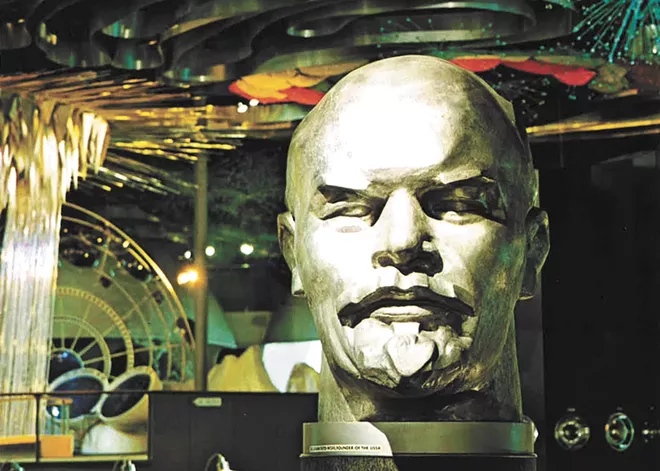
"They have family, they have loved ones, they miss their pets," Eberly says. "It's not that they're here to spy on us, it's not that they're here to do anything nefarious, they're just doing their job. It's a temporary assignment, and they got homesick, too."
Cole, the "father of Expo," spoke a little bit of Russian and would have the delegation over to his family home for dinners.
At first, the dinners were very formal, says Mary Cole, one of Cole's eight children. The Soviets would eat, have a little dessert and then leave. But she says that her parents made the Russians feel welcomed and that they seemed to warm up over time.
Nancy Cole, another of Cole's daughters, recalls her father taking some Soviets fishing.
"These Russian people that came, they all became good friends," Nancy Cole says.
The Soviet delegation was almost always accompanied by KGB agents — including during the fishing trip, when Nancy Cole says the agents sat on the shore and watched.
"The KGB agents, they came here with 'em, because they wanted to make sure they weren't going to defect," Mary Cole says.
Eberly says the KGB agents were a regular presence in the restaurants. The agents were very concerned about people defecting and seeking asylum in the U.S., he says, and they would often pop in the kitchen unexpectedly while the chefs were working.
"You could see the chefs all kind of stiffen up and get very quiet," Eberly says.
MODERN CONNECTIONS
Expo '74 didn't end the Cold War. But it did offer citizens of two rival superpowers a rare glimpse into one another's lives — and shared humanity. The Soviets left town after the world's fair ended, but that wasn't the end of Russian culture in Spokane.
After the collapse of the Soviet Union in the early 1990s, a large number of immigrants from former Soviet republics began moving to Spokane — many of them seeking asylum from religious persecution. After graduating with a bachelor's in Russian language and linguistics, Eberly started working as an interpreter helping the new arrivals navigate the social benefits available. He later worked at Central Valley School District teaching English to Russian-speaking immigrants.
Spokane's climate is similar to that of Eastern Europe, and after the first wave of immigrants established themselves, others followed, and the city became a hub for Russian-speaking people seeking community.
"We have churches, we have stores, we have auto body shops, we have people that can help find jobs — it just kind of grew this community," Eberly says.
Spokane's Slavic and Russian-speaking community has continued to grow in recent years. Since Russia's invasion of Ukraine in 2022, at least 2,200 Ukrainian refugees have come to Spokane. A number of Russian refugees have also sought asylum in Spokane.
Eberly still has fond memories of Expo and his time with the Soviets. He was vegetarian at the time and recalls the chefs going out of their way to make omelets and other vegetarian-friendly food for him.
"It was a great time, definitely one of the highlights of that part of my life," Eberly says. "It's one thing to study a language in a classroom... it's another thing to take that language actually into a workplace and be able to use that language and be able to communicate."
Additional reporting by Samantha Wohlfeil
IRAN BEFORE THE FALL
Along with the Soviets, there was another nation soon to experience major political upheaval that became a big attraction at Expo '74. Then a staunch ally of the United States, but today a geopolitical foe, Iran brought a contingent to host its lavish pavilion in Spokane.
King Cole, the leader of the Expo effort, and his wife, Jan, were invited to visit the shah and queen in Iran and made the trip to Tehran. After a long tour of their historic sites, they met Queen Farah, a champion of Iranian culture, who wondered why they had not brought their eight children along! Nonetheless, the relationship was cemented, and Iran shared its culture throughout the fair.
In just four short years, however, Iranians rose up against the monarchy; in January 1979, Shah Mohammad Reza and Queen Farah fled Iran for good — along with many of their countrymen and women who were suddenly displaced. Soon the Islamic Republic of Iran was in control; later that year, 53 American hostages were taken by revolutionaries, a saga that dominated American media as they were held for more than a year. Today the Islamic Republic of Iran is among the United States' most difficult adversaries. Iran's season in Spokane perhaps remains the high point of the relationship over the past 50 years.
—TED S. McGREGOR JR.

